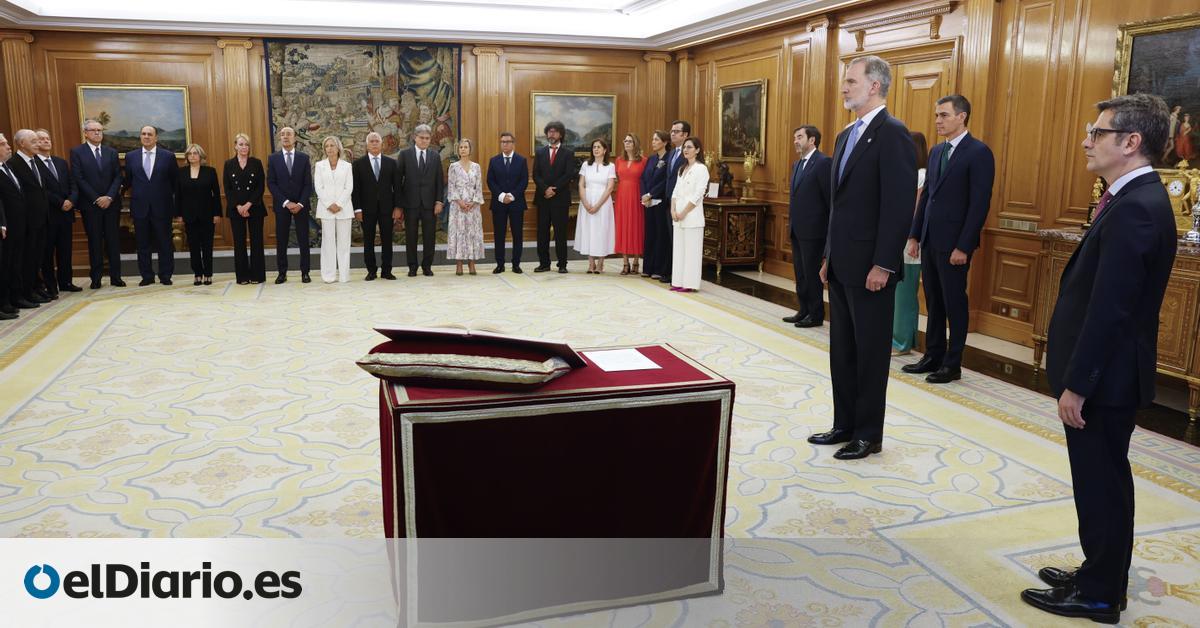
The new General Council of the Judiciary has proposed seven Supreme Court judges as candidates to preside over the governing body of judges. Pilar Teso, Pablo Lucas, Carmen Lamela, Ángeles Huet, Ana Ferrer, Antonio del Moral and Esperanza Córdoba are the candidates to preside over the body in a decision that the Council will have to make on Tuesday of next week.
Three of the candidates come from the Supreme Court’s Criminal Division: the conservatives Antonio del Moral and Carmen Lamela and the progressive Ana Ferrer. Del Moral and Ferrer were part of the court that tried and sentenced the trial, while Lamela was the first judge to order Junqueras’ imprisonment when she was a member of the National Court.
The other four candidates come from the administrative litigation chamber: Pilar Teso, who was already a candidate in 2013, Ángeles Huet, Esperanza Córdoba and Pablo Lucas.
Los 20 new members of the Council They arrived at the governing body of the judges at 1:20 in a minibus after swearing their oaths of office in Zarzuela before the king and the president of the Government. In the hours before, outgoing members such as Pilar Sepúlveda or Clara Martínez de Careaga left the building with their belongings and suitcases, saying goodbye to the workers of the governing body of the judges. Vicente Guilarte, the last president of the recently renewed Council, also entered the building and refused to make any statements about the renewal: “I don’t know anything, I’m nobody,” he said, laughing.
The exhumation of Franco
The General Council of the Judiciary now has a week to vote and appoint its next president. All the candidates come from two chambers of the Supreme Court that in the last decade have judged and ruled on key cases such as the independence process, different separate parts of the Gürtel case, the ERE in Andalusia or the exhumation of Franco’s body.
Pilar Teso has been a judge since 1985. One of the most respected members of the administrative litigation chamber, Teso was already a candidate to preside over the governing body of judges in 2013, when the chosen one was Carlos Lesmes, her colleague in the chamber. On that occasion, more than a decade ago, Teso obtained four votes compared to the 16 that made Carlos Lesmes president.
Considered to have a progressive profile, Teso was part of the court that in 2019 endorsed the exhumation of Franco’s body, along with Pablo Lucas. Two other of her colleagues from the third chamber complete the list of candidates: Esperanza Córdoba and Ángeles Huet. The first arrived at the Supreme Court in 2020 and had previously served as head of the Inspection Service of this body. Huet acceded to the Supreme Court on the same day as Córdoba did, two of the last appointments that the Supreme Court made before a legal reform prevented it from making interim appointments.
Pablo Lucas, for his part, has been for years the Supreme Court judge in charge of coordinating relations with the National Intelligence Centre (CNI) and supervising and authorising, in practice, certain investigative proceedings into Spanish espionage. He authorised, among others, the wiretapping of Pere Aragonès and Oriol Junqueras by the CNI.
The process, the ERE and the amnesty
The three candidates from the Criminal Chamber have also signed some of the most important decisions of the last decade. Ana Ferrer, the first woman to enter this chamber of the Supreme Court, is considered to have a progressive profile and was part of the court that sentenced and condemned the Catalan independence process in 2017. She also recently issued a dissenting vote against condemning the former Andalusian president, José Antonio Griñán, for embezzlement, and has spoken in favour of an amnesty to pardon this crime in the case of the Catalan independence leaders who have been indicted.
Antonio del Moral, a conservative and very close to Manuel Marchena, was also part of the court that condemned the process. Among other matters, he will be the rapporteur of the sentence on the PP’s ‘black fund’ and the black reform of the central headquarters of the party now presided by Alberto Núñez Feijóo. Carmen Lamela, for her part, was part of the court that judged and condemned the ERE of Andalusia and before entering the Supreme Court, in the National Court, she issued the first prison order against Oriol Junqueras.
The Minister of Justice, Félix Bolaños, referred to this agreement this Thursday: “Today is a great day for Spanish justice. We are finally saying something that we thought we would never be able to say: the Judicial Power Council has been renewed.” In statements to the media
Regarding the presidency of the new Council, Bolaños explained: “Now it is time for the members of the Council to talk, discuss and agree on the figure of the new president. Something they will do in the next few days, as mandated by law.”
Source: www.eldiario.es

